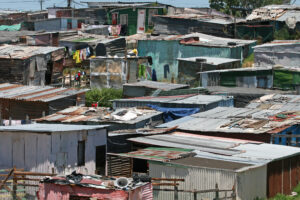The World Economic Forum in Davos has been grappling with strategies on bridging the growing global economic divide.

With UN statistics showing six out of 10 children living in SA are multidimensionally poor – 67% of them in low-income households – government faces a phenomenal challenge of bridging the unequal divide between the rich and poor, economists say.
The World Economic Forum in Davos has been grappling with strategies on bridging the growing global economic divide.
In one of the papers prepared for the annual forum, Oxfam International interim executive director Amitabh Behar described problems currently faced by the world as “daunting”.
ALSO READ: ‘You don’t come with a bag full of money’: Godongwana gears up to take on Davos
“Many countries are locked in conflict; the frequency of extreme weather events is on the rise and, every day, we see the distress of families who have lost everything,” Behar said.
“Millions of people are still grappling with the economic fallout of Covid, while contending with escalating cost of living.
“Five billion people are poorer than they were in 2020. In stark contrast, the world’s richest are enjoying wondrous prosperity.
“New Oxfam research shows the five richest men have seen their fortunes more than double since 2020.
“Billionaires are $3.3 trillion (about R62 trillion) or 34% richer compared to the beginning of this decade of crisis, with their wealth growing three times as fast as the rate of inflation,” Behar said.
ALSO READ: SA in no position to take advantage of World Economic Forum
Economist Dr Mirriam Altman and University of Johannesburg associate economics professor Peter Baur said child well-being was vital.
Key challenges included “the persistently high levels of unemployment, low economic growth and vast numbers of South Africans living in poverty”, said Baur.
“The UN has indicated key driving factors for multidimensional poverty are due to the poor state of the national social infrastructure, with many households and children suffering from high levels of hunger.”
Poverty, inequality and social distress had “long-term impacts on children, which follow them throughout their lives”.
“Better access to healthcare facilities, better schooling programmes and better nutritional support, is vital,” he said. “A large factor affecting child poverty is income inequality.”
The gap between the rural and urban population would require “key investment strategies, which will diversify economic growth patterns from urban centres into rural communities”.
“Social infrastructure development is critical, along with the instruments to accurately measure changing patterns of poverty and inequality – especially among the youngest of our population.
“It is not enough to just tackle unemployment when the greater majority of the children remain hungry,” said Baur.
ALSO READ: Chief economists divided over global economy outlook in 2024
“It should involve early childhood support for children ages zero to four, when critical cognitive and physical development happens,” said Altman.
“While there is growing attention to this, children still suffer from high micronutrient deficiencies, showing not enough progress is being made.
“Policy around household nutrition and food security is another critical area, involving education, stable food prices and food fortification.
“There are good Cabinet-approved policies but indicators show we are still facing volatile and often rising cost of basics.” She said universal healthcare coverage was “a critical area”.
“Far too much attention is going to the debate on NHI (national health insurance) – as compared to the more critical actions of strengthening public health services across the board.
“Health insurance and integration of public and private systems as envisaged in the NHI can only be beneficial once the public healthcare system is made sufficiently robust,” Altman said.
Support Local Journalism
Add The Citizen as a Preferred Source on Google and follow us on Google News to see more of our trusted reporting in Google News and Top Stories.






